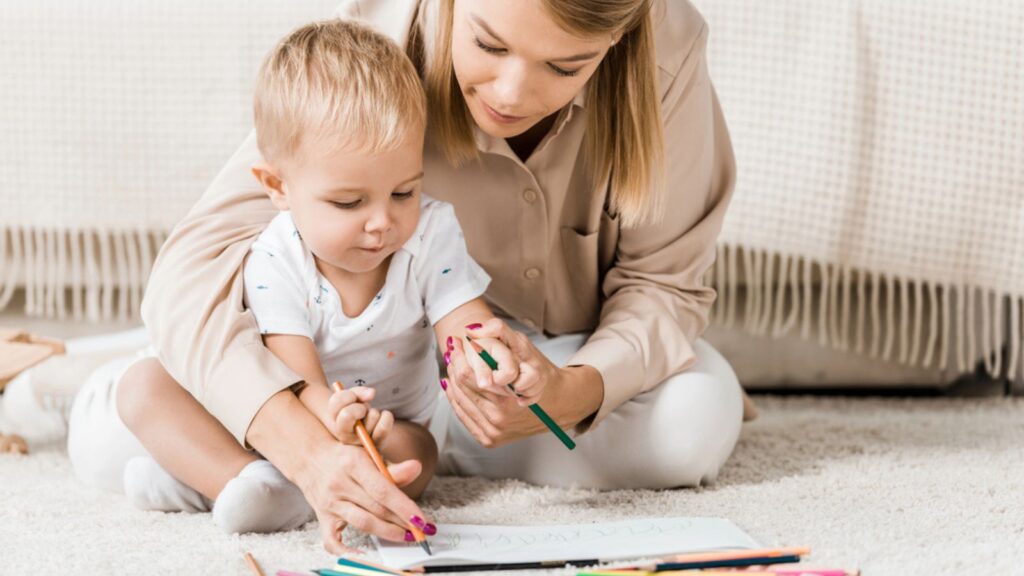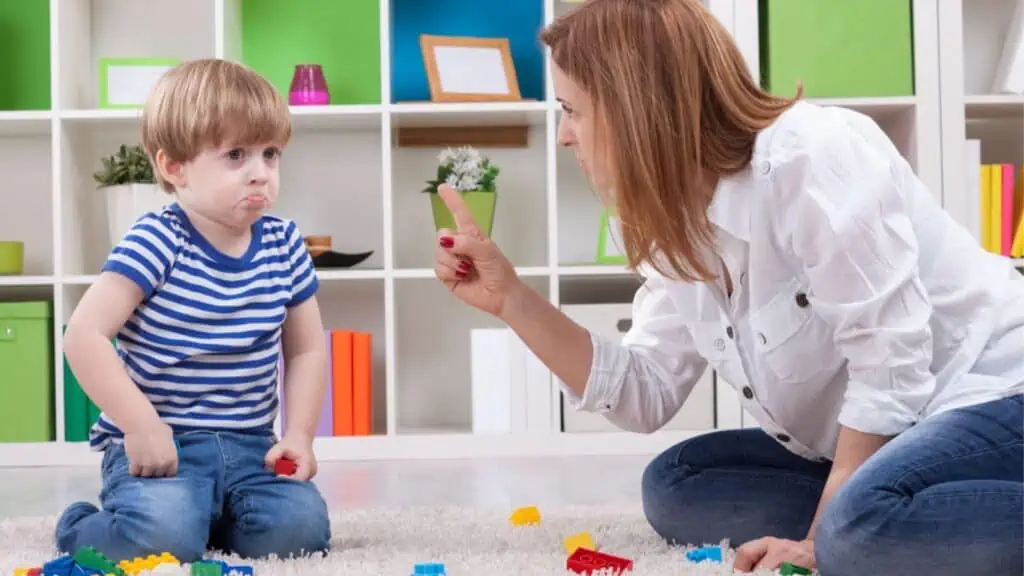17 Ways to Calm Your Nerves When the Kids Are Driving You Crazy
This post may contain affiliate links. As an Amazon Associate, I earn from qualifying purchases.
It’s baffling that our sweet, cute little babies have the potential to rearrange your brain in several unwelcome ways. Parenting is among life’s most joyful experiences, but it can be challenging to manage their endless energy. It may seem counterintuitive, but psychologists say that children act out most in places they feel safe, leaving parents frazzled.
The relentless need for attention and continuous activity can overwhelm even the most patient parents, leaving them feeling like they’re losing their minds. Discovering effective methods to soothe your nerves in these demanding moments is crucial for your mental health (and feeling like a better parent). Your steps will depend on your child’s age and the situation.
Here are a few creative and sane ways to regain your peace of mind and enjoy the whirlwind ride of parenting.
1. Take a Deep Breath

You’ll be surprised how the simple exercise of taking a deep breath can help calm your nerves. Deep breathing is a powerful tool in restoring calm and focus when the chaos of your children is peaking. Focus on your breath, inhale slowly, and count to four. Hold your breath, and exhale slowly. This method relaxes the body and lowers heart rate and blood pressure. It will take some practice since the last thing you want to do when you’re feeling triggered is breathe deeply.
Make deep breathing a regular part of your parenting strategy, and teach your children learn to use this technique when they feel overwhelmed. It’s a dual benefit. It teaches your children a valuable skill in managing their emotions.
2. Find a Calming Activity For Them

When the chaos of children becomes too much to handle, finding a calming activity for them can be a great way to redirect their energy and soothe your nerves. Depending on your child’s age, this could be anything from coloring or drawing to listening to calming music or walking in nature.
Engaging in a peaceful activity together can help you both take a break from the chaos and reset your minds. It can also serve as an opportunity for bonding and quality time with your child, providing them with an outlet for their energy and emotions.
3. Establish a Quiet Zone

Sometimes, it may feel like you’re living in a beehive and you’re not the queen bee. When the house is buzzing with clutter, clang, and screaming babies, it helps to designate a quiet zone in your home that will be a sanctuary for both you and your children. This spot should be free from loud toys, electronics, and other distractions.
It’s a space where anyone can go to feel calm, read a book, or simply sit in silence. Having a quiet zone encourages moments of privacy and meditation, which help manage emotions and reduce stress.
4. Use Positive Reinforcement

Positive reinforcement can transform a household’s dynamic from chaos to calm. Acknowledge and reward good behavior with praise, stickers, or a small treat (rather than focusing on misbehavior and constantly nagging). This approach motivates children to repeat those behaviors and fosters a positive atmosphere at home where children feel valued and understood.
Children love to be appreciated; sometimes, they may drive you crazy to get your attention. A little appreciation tells them you see them, which may calm them enough for you to catch your breath.
5. Schedule Regular Physical Activities

Children have boundless energy, and one of the best ways to manage this is through regular physical activity. Whether it’s a daily family walk, a bike ride, a dance party, or a visit to the playground, physical exercise helps to burn off excess energy, reduces stress, and improves everyone’s overall mood.
Not only does physical activity benefit your children, but it also allows you to release some tension and unwind. It’s a win-win situation for both you and your kids. You may take a turn at the swings and remember what it felt like to be a child again.
6. Practice Mindfulness

Introducing mindfulness practices like meditation or yoga can be surprisingly effective for you. These practices will teach you how to live in the moment and respond to stress in a more balanced way. This will enhance emotional resilience and reduce anxiety.
When you’re feeling overwhelmed, be present in the moment for a few minutes. This will help calm your nerves and allow you to approach the situation with a clear, level-headed mindset. Sometimes, all you really need is a little moment to remind you that these crazy moments will end one day, and you may even miss them when they do.
7. Set Clear Boundaries and Routines

Consistency is key in parenting. Setting clear boundaries and establishing routines gives children a sense of security and helps them understand what is expected. This can significantly reduce tantrums and erratic behavior as children feel more grounded and less anxious about the unknown.
The children may be small, but they know something about wrapping you up in their little fingers and trying to cross the lines. Keep the boundary lines clear and lovingly guide them into obeying. This consistency will give them stability and help them understand that they’re loved despite the strong hand.
8. Encourage Creative Play

Encouraging your children to engage in creative play is a fun and therapeutic way to express emotions. Arts and crafts, role-playing, and building projects can help children explore their feelings nonverbally, aiding in emotional release and regulation.
Not only does creative play provide an outlet for emotions, but it also helps develop problem-solving skills and boosts self-esteem. Plus, it’s a great way to relive your childhood memories and bond with your children.
9. Use Technology Wisely

Many parents are guilty of handing their kids a gadget anytime the fussing reaches a crescendo we aren’t ready to deal with. While too much screen time can contribute to children’s restlessness, educational apps and programs can be beneficial in moderation.
Choose engaging and enriching content and balance it with plenty of screen-free time to stimulate creativity and physical activity. Limit screen time to enough time to rest and reset. Don’t let the screen be your getaway plan every time you need peace—which will be a lot of times.
10. Take Time for Yourself

Being a parent may feel like you’re losing yourself, and you will if you’re not deliberate about taking time for yourself. Parenthood can be overwhelming, and recharging your batteries is essential. Take breaks when you can, ask for help from family and friends, or hire a babysitter to give yourself some time to relax and reset.
Doing things you enjoy will make you a better parent in the long run. It helps manage stress and maintain emotional balance. Activities like reading, solo walks, or having coffee with friends can replenish your patience and energy.
11. Stay Connected as a Couple

While it’s totally possible to parent alone, having the right person to do it with makes things easier. If you’re co-parenting, keep the lines of communication open with your partner. Share the responsibilities, discuss parenting strategies, and ensure you’re both on the same page. This unity models healthy relationship dynamics for your children.
Set aside quality time for each other, whether it’s a date night or simply talking and cuddling after the kids have gone to bed. Staying connected as a couple strengthens your bond and reminds you that you’re not alone in this crazy journey of parenthood.
12. Seek Support When Needed

They’re your children and your sole responsibility, but remember, it’s okay to ask for help. Whether it’s family, friends, or professional support, having a network to lean on can provide relief and practical help during challenging times. Sharing experiences with other parents can also offer valuable insights and coping strategies.
It takes a village to raise a child, and it’s okay to lean on that village when times get tough. You will be surprised to hear the other parents’ experiences and realize that your kids are normal, after all.
13. Foster Independence

Maybe your children have made you their toy and source of entertainment. This is not sustainable, and you will soon wear yourself out. Teach your children to be independent by assigning them age-appropriate tasks and responsibilities.
This helps them develop crucial life skills and fosters self-esteem as they see what they can achieve on their own. Encouraging independence can also ease your workload, creating a more balanced and cooperative household.
14. Teach Them to Navigate Conflicts with Compassion

If your children seem to bicker and fight with their siblings, teach them how to resolve conflicts with compassion and understanding. All the screaming and blaming and endless “Mom!” can wear you out. Remind them how to have fair fights and solve conflicts among themselves.
Role-playing and discussing hypothetical scenarios can prepare them to handle disagreements constructively. Encouraging empathy towards others’ feelings fosters a nurturing environment where everyone feels heard and valued.
15. Celebrate Their Individuality

Maybe your child’s insisting on their own choices against your advice is driving you crazy. Remember, they may be children, but they have a mind of their own. Every child is unique, with their own passions, strengths, and challenges. Celebrate these differences by allowing them the freedom to explore their interests and express themselves in their own way.
Encouraging individuality builds self-confidence and helps children develop a strong sense of identity. Listen to their ideas and support their choices, even if they deviate from your preferences or the family norm. This affirmation will strengthen your bond with them and empower them to make positive choices and stand confidently in who they are.
16. Find The Humor in The Situation

Finding the humor in everyday situations can be a game changer. Laughing together over spilled milk or a toddler’s innocent mischief can lighten the mood and bring relief. It teaches your children not to sweat the small stuff and shows them that mistakes and accidents are just part of life.
Sharing a laugh can strengthen the bond between you and your kids, creating lasting memories and a joyful home environment. Next time your child accidentally paints the walls with spaghetti sauce, take a deep breath and find the humor in the situation. After all, they’re only little for so long, and these moments will soon become cherished memories.
17. Eat

When the chaos of parenting seems to reach new heights, eat. You’ll be surprised how a simple bowl of your favorite food or guilty snack can help you manage your moods. Parenting is a marathon, and you need to fuel yourself for the long haul.
Accompany your child’s snack time with your own snacks and take regular meal breaks to keep your energy levels up. Incorporating foods rich in magnesium, such as leafy greens, nuts, seeds, and whole grains, can also help relieve stress.
20 Strong Words Parents Should Never Say to Their Kids

Countless adults sitting in a therapist’s office today are grappling with the lasting impact of words spoken by their parents during childhood. Regardless of how you perceive yourself, in your child’s eyes, you are nothing short of the most remarkable thing to happen to them since “skip intro.” This underscores the critical importance of being mindful of what you say to your children, as your words become the small but influential voice in their developing minds.
20 Strong Words Parents Should Never Say to Their Kids
16 Common Phrases Grandparents Should Stop Saying to Their Grandkids

Do you still remember something your grandparents said that made you uncomfortable? As much as we adore our grandparents, their words (even with good intentions) can sometimes hurt our feelings or are plain embarrassing.
If you are a grandparent, using your words mindfully around your grandkids is as crucial as any other relationship. Words hold immense power and shape our kids’ behaviors and perceptions.
16 Common Phrases Grandparents Should Stop Saying to Their Grandkids







